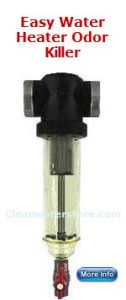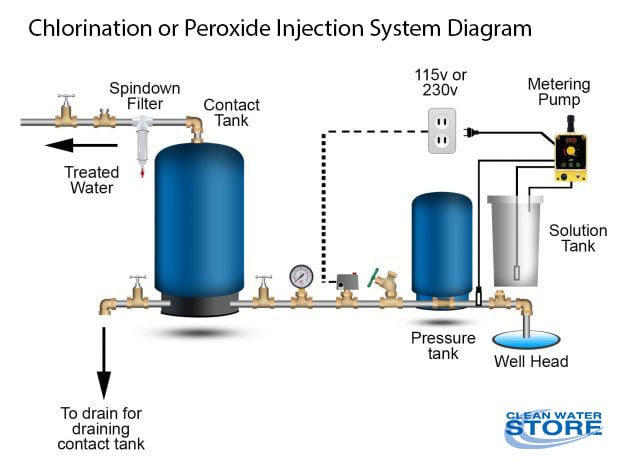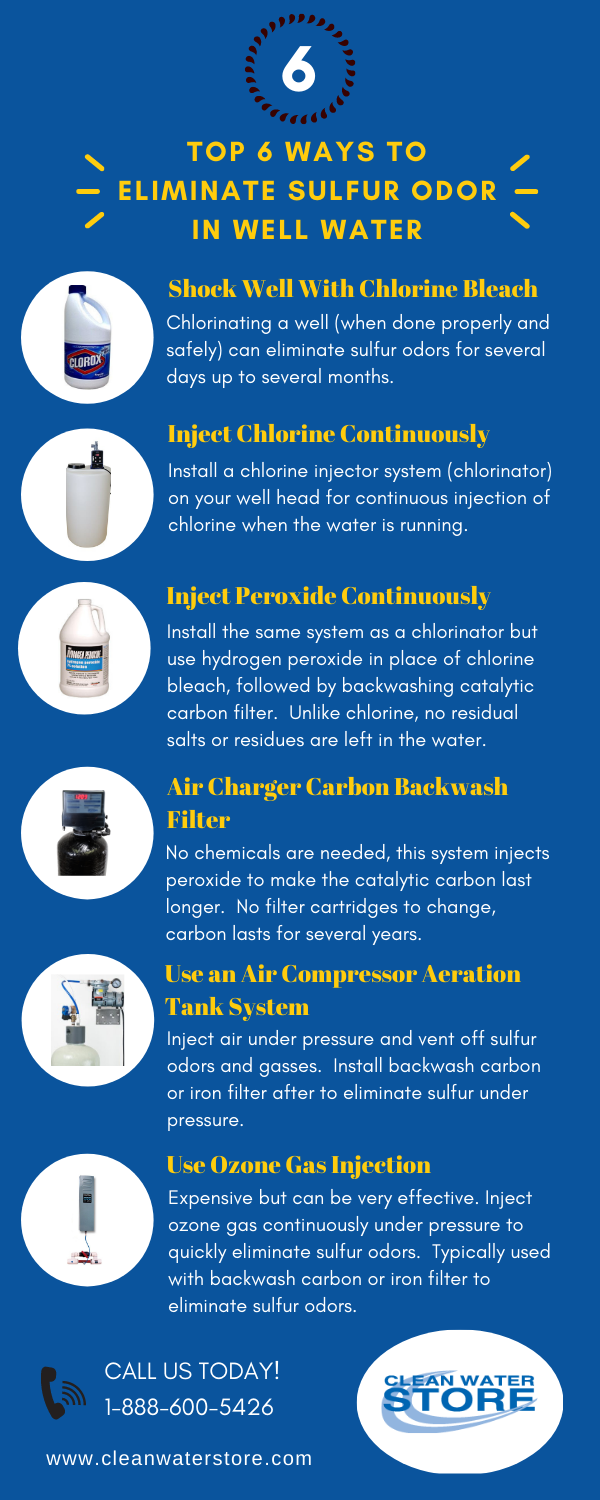
Well Water Smells Like Rotten Eggs
“My well water smells like rotten eggs” or “My water smells like sulfur”. You often hear these Sulfur Smell In Water comments from your friends and family.
We have helped thousands of our customers learn how to get rid of rotten egg odors in their water.
Whether the rotten egg smell in house is from only the hot water or cold water or both, if you are experiencing problems with well water smells, follow these simple steps.
Step 1: First, Check For Water Smells in Cold & Hot Water
The first step to finding out what to do when your water smells like rotten eggs is to see if the odor is from scorching water only, or if it is also coming from the cold well water.
Run a hose bib or tap as close to the well as possible, fill a 5-gallon bucket or another container, and notice if there are odors.
This is hydrogen sulfide gas if you smell a “rotten egg” odor. This can be from manganese if the water smells like oil or asphalt. If your water smells like cucumber or sewage, this is usually a result of iron and/ or sulfur bacteria.
Run the hot water from each tap and notice if there is an odor in hot water that is not apparent in the cold water.
If there is only an odor in hot water, this indicates a problem with the water heater.
Sulfates in water, as well as iron and sulfur bacteria, can interact with the anode rod in water heaters.
This creates hydrogen sulfide gas which is the rotten egg smell in water. Changing the anode rod to an aluminum rod can often solve this problem of having well water that smells like sulfur.

This device makes it easy to periodically add some store-bought hydrogen peroxide to the water heater, which kills the odor instantly and is safe to use.
Water Heater Sulfur Odors Only?
Read How to Eliminate Odors from Hot Water
Step 2: Test Your Water
If there is an odor problem with the water supply, the first step is to determine the source.
If your water source is a public water system and you have problems with smells in the cold water, contact your water utility or call us for help.
If the source is from the well, a general mineral water analysis is critical to selecting the right system to treat the problem.
The test should include analysis for pH, iron, manganese, hardness, total dissolved solids at a minimum. Other tests for sulfate, hydrogen sulfide and tannin are recommended as well.
Take the sample as close to the well as possible. With these results, you can identify the best type of water treatment to use and what type of system to select based on your water chemistry.
Your well water should be tested for total coliform and e-Coli (fecal coliform) for health-related issues. If infants and children will be drinking the water, a general mineral, metals, and a bacteriological test is recommended.
Water Smells like Rotten Eggs: Choose a Method To Get Rid of Rotten Egg or Sulfur Smell in Water
ONE: If you have sulfur odor only in cold and hot water and no iron or manganese (rust, red or black staining), the best option is to use an Air Charger Carbon Filter with a peroxide cleaning kit (which comes as an option).
TWO: If you have extreme sulfur odors from the cold well water, we recommend shocking the well with chlorine and installing a peroxide injection system with a backwashing carbon filter (see below).
THREE: If your well water smells like rotten eggs and you have iron in your water and rust staining, install a chlorinator followed by an iron filter.
FOUR: If you only have rotten-egg sulfur smells in hot water, we recommend installing a Water Heater Odor Killer.
(If you want to read more about the Sulfur odor in water, check this post out.)
- Use 5% grade liquid bleach or 12% liquid pool chlorine OR 7% hydrogen peroxide. The same system can inject either bleach or peroxide.
- The precise dosage of chlorine or peroxide makes it easy to control.
- After the peroxide injection system, use a whole house carbon filter to remove any residual chlorine or peroxide residual in the water.
- The result is clean, fresh, disinfected, odor-free, and chlorine-free water throughout your home.
- Safe for septic tank systems
- Works over a wide range of water flow rates for most home water wells
- Good for chlorinating well water flow rates from 1 to 50 Gallons Per Minute (1 – 50 GPM)
- Works for line pressures up to 110 PSI
- Unlike Stenner-style or other types of peristaltic pumps, good quality diaphragm pump has no pump tube failures, no rollers to go bad, need less frequent service, and are suitable for continuous duty.
Hydrogen sulfide gas (“H2S”), has a distinctive “rotten egg” sulfur smell, which may be especially noticeable when running hot water.
Such water can discolor coffee, tea, and other beverages and alter the appearance and taste of cooked foods. Hydrogen sulfide (“H2S”) gas is a nuisance that is not usually a health risk at concentrations normally found in household water.
However, hydrogen sulfide can be toxic. Usually, the gas can be detected long before it reaches harmful concentrations. H2S is flammable and poisonous.
H2S dissolved in water can corrode plumbing metals, such as iron, steel, copper, and brass, and exposed metal parts in washing machines and other water-using appliances.
The corrosion of iron and steel from hydrogen sulfide forms ferrous sulfide or “black water,” which can darken silverware and discolor copper and brass utensils.
Hydrogen sulfide can also interfere with the effectiveness of water softeners and filter systems.
Sources of Hydrogen Sulfide
Iron and sulfur bacteria in groundwater use iron and sulfur as an energy source and chemically change sulfates to produce H2S gas.
These bacteria use the sulfur from decaying plants, rocks, or soil and often thrive in an iron-rich environment.
The harmless, non-toxic bacteria normally exist in oxygen-deficient environments, such as deep wells and plumbing systems. The bacteria do not usually cause health problems but contribute to bad tastes and/or odors at low levels.
Hydrogen sulfide gas may also naturally present in wells drilled in shale or sandstone, near coal or peat deposits, or oil fields.
Though H2S is normally found in wells, it can also enter surface water through springs and quickly escape into the atmosphere.
Often your water heater can become a source of foul H2S smells. The magnesium rod used in heaters for corrosion control can chemically reduce sulfates to hydrogen sulfide gas (rotten egg smell) and may need to be replaced with a different type of anode.
This odor can also be eliminated with the use of a Water Heater Odor Killer.
Health Effects of Rotten Egg Odor (Hydrogen Sulfide Gas)
High levels of sulfur odor (hydrogen sulfide gas) 100 PPM or over can cause sickness and death. However, the levels found in homes or from well water is lower in the range of 1 – 5 PPM.
Low Concentration Immediate/Short Term Exposure :
- Irritation of the eyes, nose, throat (watery eyes)
- Irritation of the respiratory system (cough, shortness of breath) especially if you have asthma
Low Concentration Repeated/Prolonged Exposure :
- Eye inflammation
- Headache
- Fatigue
- Irritability
- Insomnia
- Weight loss with digestive disturbances
Moderate Concentrations:
- More severe eye irritation
- Severe respiratory irritation (cough, difficulty breathing, accumulation of fluid in the lungs)
- Headache and dizziness
- Nausea
- Vomiting
- Staggering
- Excitability
High Concentration:
- Shock
- Convulsions
- Inability to breathe
- Extreme rapid unconsciousness
- Coma
- Sometimes death
Information provided by OSHA
Sulfate is a dissolved naturally occurring mineral. At levels of 250 PPM or higher sulfate can cause a laxative effect if the water is consumed. High levels of sulfate can be easily tested with a test kit or laboratory analysis.
Hydrogen sulfide is gas and must be tested on-site. Sulfate has no odor, but high levels of sulfate with water that is not disinfected can cause hydrogen sulfide by the action of sulfate-reducing bacteria.
Top 6 Ways to Get Rid of Water Smells like Rotten Eggs
1. Shock your well with chlorine bleach or hydrogen peroxide to get temporary relief from sulfur odors. Often keeps odors away for 1 – 2 months.
2. Chlorinator: Install a chlorine injector system (chlorinator) on your wellhead for continuous injection of chlorine when the water is running. Chlorination eliminates the sulfur bacteria that cause the odor and combined with an Air Charger self-cleaning backwash carbon filter, can eliminate odors continuously and take out chlorine residual before the home.
3. Peroxide: Install the same system as a chlorinator but use hydrogen peroxide in place of chlorine bleach, followed by backwashing catalytic carbon filter. Unlike chlorine, no residual salts or residues are left in the water after water flows through the carbon system.
4. Air Charger Carbon Filter: Install an Air Charger Catalytic Carbon Filter. No chemicals are needed; however, the system also can inject peroxide to make the catalytic carbon last longer. No filter cartridges to change. Carbon lasts for several years and is easy to change out.
5. Air Compressor Tank Aeration System: This injects a lot of air under pressure and can eliminate odors under certain conditions.
6. Ozone Gas: Expensive but can be very effective. Inject ozone gas under pressure to quickly eliminate sulfur odors
See our section “Odor Systems” for filters and systems to remove odors from well water.
Frequently Asked Questions About Well Water Smells Like Rotten Eggs
Determine if the odor is from hot water only or both hot and cold by running the hot and cold water.
Replace the anode rod in the hot water heater with an aluminum rod or powered anode. Add a Water Heater Odor Killer to make it easy to add store-bought hydrogen peroxide to the water heater.
I have the rotten egg smell in kitchen, but not rest of the house. How can that be?
If you have rotten egg smell in kitchen but not from other taps, this can be from bio-films in your pipes. If the cold water coming in from well has no odor but you do smell it from cold water fixtures in the house, you can often get rid of this by using chlorine bleach. Find a way to introduce one or two cups of household bleach into the pipes, run water from the affected fixture until you smell chlorine, then turn off and let sit for 4 to 6 hours.
If you are on well water and have a sulfur odor in both cold and hot water, and no iron or manganese (rust, red or black staining) the best option is to use an Air Charger Carbon Filter with the peroxide cleaning kit.
If your well water smells like rotten eggs and you also have iron in your water, install a chlorinator followed by an iron filter.
Sulfate is a dissolved naturally occurring mineral and at levels of 250 PPM can cause a laxative effect if the water is consumed. High levels of sulfate can be easily tested with a well water test kit or laboratory analysis.
Hydrogen sulfide is a gas and must be tested on-site. Sulfate has no odor, but high levels of sulfate in water that is not disinfected can cause hydrogen sulfide by the action of sulfate-reducing bacteria.
High levels of sulfur odor (hydrogen sulfide gas) 100 PPM or over can cause sickness and death. However, the levels found in homes or from well water is lower in the range of 1 – 5 PPM.
- Eye inflammation
- Headache
- Fatigue
- Irritability
- Insomnia
- Weight loss with digestive disturbances
You must test on-site. Samples cannot be sent to a lab. There are various hydrogen sulfide test kits available. Most do not give exact results but can you give us a range.
Do you have rotten egg or sulfur smells in your cold or hot water? Or would you like more help in learning how to treat sulfur odors in well water?
Email our technical support department at support@cleanwaterstore.com or call us for help at 1-888-600-5426!
Read More About How To Treat Sulfur Odor in Well Water
Read the PDF on Hydrogen Sulfide and Sulfate
Drinking-Water Wells produced by the University of Massachusetts








